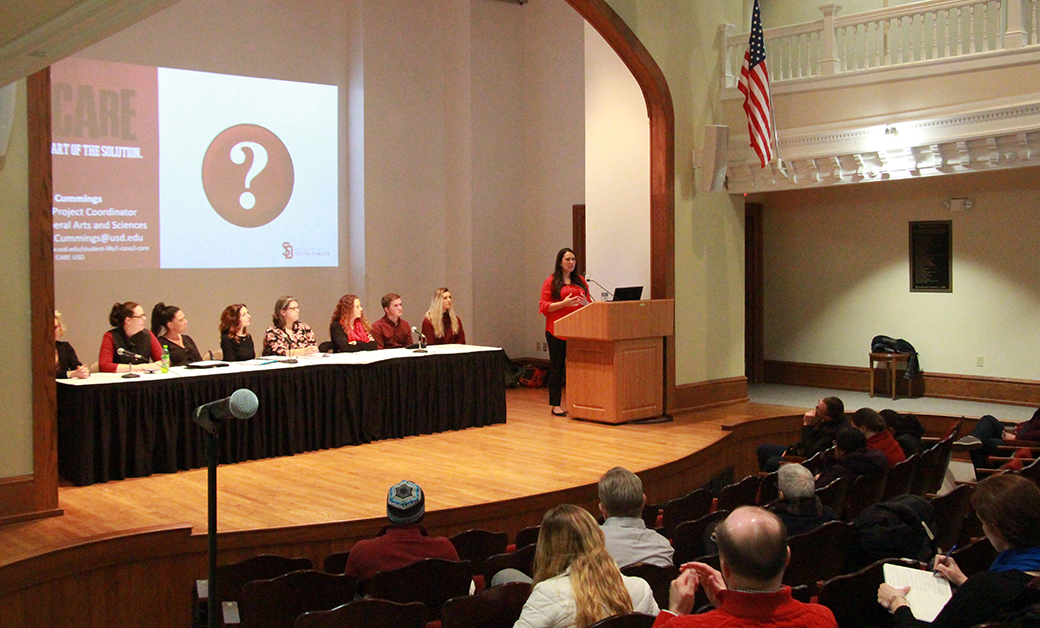
ICARE panel answers questions about sexual assault grant sustainability, inclusion
An introduction panel question and answer session for ICARE, a $300,000 sexual assault prevention and education grant the university received in 2016, was held in Farber Hall on Thursday night. A panel of ICARE subcommittee and Coordinated Community Response Team (CCRT) members fielded questions from students, faculty and community members about how the sexual assault prevention education grant will be launched at USD.
One question from the audience was about the bystander intervention program called “Bringing in the Bystander.” This new programming will start in the fall of 2018.
“Bystander intervention training is not just about behaviors, it’s about being a stand-up person everyday,” said Bridget Diamond-Welch, grant program director and assistant professor of criminal justice. “If you hear something, or if someone’s making fun of the tea video, or someone’s belittling (sexual assault), it’s giving people the skills and the confidence to step up and say that’s not okay to do that.”
Regarding the three year term of the grant, an audience member asked what would be done to make the grant sustainable after the three year period is up.
“The reason that we have these key people that chose to participate in the committee work, is because that committee work can go on even if my position is not here, the work can still continue and be institutionalized that way,” said Marisa Cummings, ICARE project coordinator.
Kim Grieve, vice president of student affairs and dean of students, said part of the grant’s requirements is to continue to sustain the programming and memorandum of understanding detailed in the strategic plan.
Another audience question was about ensuring that ICARE is inclusive of different marginalized communities on campus. Cummings said steps are being taken to be more inclusive of marginalized groups.
“Part of our technical training institutes is ensuring that marginalized groups who we know from data are more likely to be sexually assaulted and less likely to report that we’re making sure to engage those communities,” Cummings said. “Some of the programming of what we do will be engaging communities that are marginalized here on campus.”
Cummings said she’s looking at partnering with student groups to discuss their programming needs.
“We’re looking at partnering with students,” she said. “We need students that are willing to participate to step forward, and I’ve reached out to student organizations to see what I can do.”
ICARE will launch in the Muenster University Center on Jan. 22. Vermillion Police Department Lieutenant and CCRT member Crystal Brady was a panelist, and she said it was nice to hear from students.
“I think it was nice to be able to tell people what we’re all about,” she said. “(The launch will) show that the Vermillion police department is supporting the launch and that we want to do it just as well as any other person that’s on this panel or part of the ICARE group.”
Other panelists were prevention coordinator and counselor Michele Turner, Deborah Dodge from student rights and responsibilities, campus victim advocate Laura Brady, SGA vice president Josh Anderson and sophomore PAVE president Alyssa Fothergill.
Fothergill is partnering with athletics and the ICARE programming subcommittee for an upcoming basketball game in order to spread awareness about sexual assault and PAVE.
“A lot of the work we’re going to be doing this semester is collaborating and just making an impact,” Fothergill said. “Joining our two groups is going to have an even bigger impact.”
Senior criminal justice major and PAVE member Emily Bashus said this panel went better than any previous discussions surrounding sexual assault that the university has hosted.
“It was more consistent, and they were all on the same page,” Bashus said. “Everyone talked about what they knew, which I feel like went better. The bystander intervention program seems like it will be a great asset to campus.”


